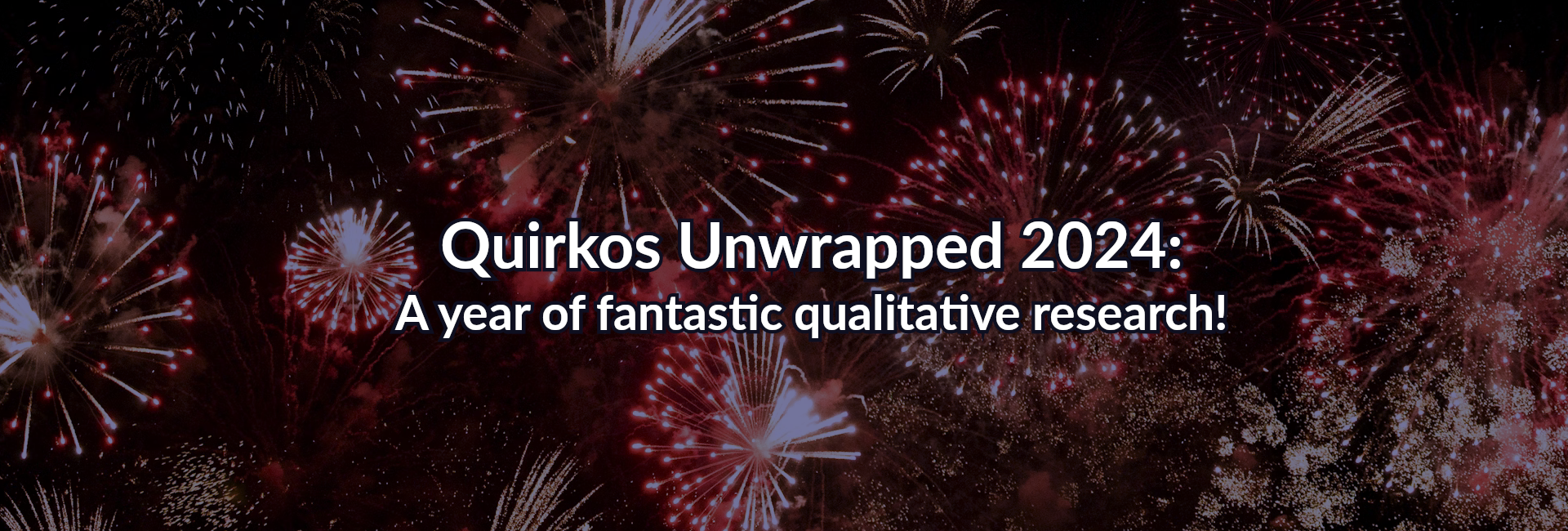Quirkos Unwrapped 2024: A fantastic year in research!

2024 has been a very productive year indeed. Our Web app and transcription service has grown and improved, and has now incorporated some of the most requested features from users. We launched our free course on qualitative research and refreshed our manual to make it clearer and reflect the many improvements and UI updates in our Web app. And perhaps most exciting of all, Quirkos is now 10 years old!
This year, Quirkos users published more than 200 theses and 200+ peer-reviewed papers! To celebrate this fantastic achievement, I've rounded up 8 amazing research articles released this year, which incorporated Quirkos into their methodology. All the articles are free to read!
Youth Participatory Action Research for Equitable Urban Design.
Anderson, K. M., McCormick, M. L., Morgan, K. Y., Gibson, M., Harper, A., Clark, M., & Christens, B. D.
This paper explores the findings of the Dream City Workshop, a participatory design workshop where Nashville high school students designed ideal cities for young people. The research team analysed the workshop data using Quirkos' collaborative real-time coding. Based on the workshops, the research team (comprised of both academics and young people) have developed and proposed urban design initiatives to government officials, with the aim of addressing structural race, health and class inequities in Nashville's design. The research also identifies helpful considerations for conducting youth participatory action research.
The Role of Indonesian Doctors as Content Creators in Fighting Health Hoaxes, Myths, and Stigma on Social Media.
Anjela, L. O., Mulyana, D., & Suminar, J. R.
Medical hoaxes are one of the most common forms of misinformation spread on social media, which can have life-threatening consequences. But public health policy is not the only way to combat this threat: there are now individual 'doctor influencers' with large platforms, able to educate the public about medical misinformation. This study explores the perspectives of Indonesian doctors who use their large Instagram presence to combat medical misinformation, and asks how to make their efforts more effective. Anjela et al found that while the doctors were successfully achieving their aim (especially when claims were being repeatedly debunked), their attempts could be made even more effective through further collaboration with each other and with health institutions.
A Scoping Review on the Opportunities for Social Engagement and Cognitive Frailty in Older Adults.
Fowler Davis, S., Benkowitz, C., Holland, C., Gow, A., & Clarke, C.
This study reviews the literature into cognitive frailty, which is a form of non-permanent reduction in cognitive and physical capacities, often experienced by older people in social isolation. The researchers used Quirkos to perform a framework analysis on the studies, finding that participation in a wide variety of social activities, a connected neighbourhood community, and a diverse social network was found to positively affect cognitive health, while experiences of loss and depression increased the chances of cognitive decline. Crucially, family dynamics and support do not prevent cognitive decline on their own and may actually contribute to social isolation (as the individual may only socially engage with their immediate family). Fowler Davis et al recommend the development of local communities and charities that can promote social engagement for older adults on a broader level.
Socioecologies in shaping migrants and refugee youths’ sexual and reproductive health and rights: A participatory action research study.
Aibangbee, M., Micheal, S., Liamputtong, P., Pithavadian, R., Hossain, S. Z., Mpofu, E., & Dune, T.
Young people in Western Australia who are migrants or refugees (or whose family has this background) often experience poorer sexual and reproductive health and rights, due to a variety of social and cultural factors. To help improve the support and consideration for this group, Aibangbee et al conducted a participatory study, arranging focus groups and using Quirkos with thematic analysis to explore the main findings. They found that peer support was one of the participants' most common sources for advice regarding sexual and reproductive health and rights, which should be taken into account by public health initiatives.
When Stories Turn Institutional: How TikTok Users Legitimate the Algorithmic Sensemaking.
Obreja, D. M.
This study used questionnaires and in-depth interviews with Romanian TikTok users to explore their relationship with the algorithm and with institutional authorities (such as religion, politics and education). After open coding the data in Quirkos, Obreja observed that despite the opaqueness of how the algorithm works, many narratives have emerged around it – resulting in an algorithm that can be sensed or 'felt', but never quite explained. Users said they found 'educational' and enriching content on TikTok, but expressed dislike for the platform's ability to show material seemingly designed to foster outrage. They noted that TikTok's algorithm showed a diverse range of content (in terms of both the type of content, and also who was being represented), but had mixed opinions on the social benefit of this, dependent on their own politics and religious beliefs. This study contributes to understandings of "algorithmic realities" - mediations between an individual's understanding of the 'algorithm', and their existing social context and perspective.
Place meaning, speculation, and emerging public perceptions of carbon-storing marine sediments in Dundalk Bay, Ireland.
Buitendijk, T., Thiemt, B., Schuitema, G., Crowe, T., & Coughlan, M.
Protecting carbon-storing marine sediments (e.g. sand, mud) from disturbance is crucial in mitigating climate change. However, this environmental issue is not as familiar as others to the general public. Buitendijk et al conducted interviews and focus groups with residents in the Irish coastal area Dundalk Bay, to explore how aware they were of efforts to protect carbon-storing marine sediments, and the potential impact on their area and community. The results were analysed in Quirkos Cloud, using collaborative reflexive thematic analysis. Many participants noted that they were "proud" of their local area and wanted to preserve it, although there was generally a tension between economic and natural/environmental concerns.
‘Do it afraid’: An arts‐based reflexive collective case study exploring youth responses to post‐concussion communication changes in daily life.
Harasym, J. A., Gross, D. P., MacLeod, A. A. N., & Phelan, S. K.
Post-concussion symptoms – including communication changes or difficulties – occur for an extended period of time in 25% of young concussion patients. This can result in poorer mental health and education outcomes for these young people. To address this, Harasym et al. developed a case study methodology which incorporated arts-based methods, to explore how young people and their families navigated post-concussion communication changes. Reflexivity was woven into this process for both participants and researchers, and was aided by the usage of creative methods which both enabled an additional qualitative dimension for the participants' responses, and was also more accessible for the participants than verbal/written methods alone. Thematic analysis in Quirkos helped the researchers to find common experiences of social isolation and difficulty navigating institutional (e.g. work/school) adjustments, after changes in communication capabilities. Equally, it was found that the participants devised their own strategies for managing their communication changes, which was empowering and actually improved their communication and social skills. This research aims to inform future guidance, support and education for young concussion patients.
More than Foodsaving Machines: Insights from Communities Fighting Food Waste in the Digital Age.
Ntouros, V., Vlachokyriakos, V., & Engelbutzeder, P.
There is often a conflict of priorities between for-profit technology platforms and grassroots social initiatives, disrupting these initiatives' aims. This study explored foodsaving and sharing communities which have incorporated an open-source alternative to these platforms (Karrot), which is specifically designed for organising community food-sharing. Ntouros et al thematically analysed semi-structured interviews and questionnaires with Karrot users, using Quirkos to organise their codes. They discovered that while the software was helpful, it did not completely replace the for-profit platforms such as Facebook or Google Docs. There were many places for improvement which would enable the software to be more flexible, interoperable with other tools, and helpful for a wider range of community action around food waste (e.g. community outreach on how to prevent food waste, as opposed to just salvaging existing food waste). This study will help direct the future development of Karrot, as well as other digital tools for community initiatives.
I always enjoy putting these articles together. The variety, quality and ambition of the research strikes me every single time, and it makes me very happy to see what you have been producing with the help of our software. It's been a challenging year for many across the world, but we still believe in the power of qualitative research to help and support difficult social problems and give voice and power to persecuted communities.
We have some big updates coming in 2025 - but for now, we just want to wish you a wonderful holiday season and a fantastic new year. After 10 years of helping the research community, we hope to support you with your world-changing research for a very long time!
If you'd like to hear from us in January, we're hosting our next Qualitative Café coworking session on January 29th, 2pm GMT. Book a place now and set a great intention for your research in the new year.
